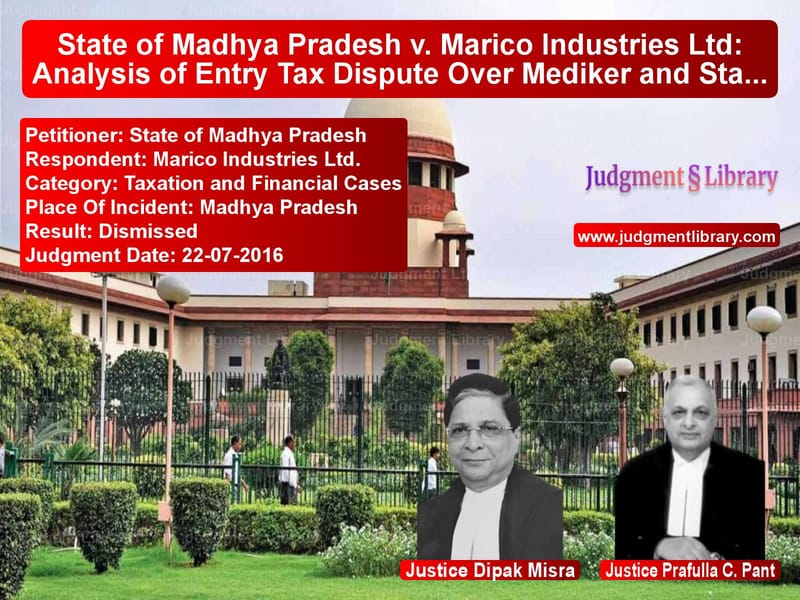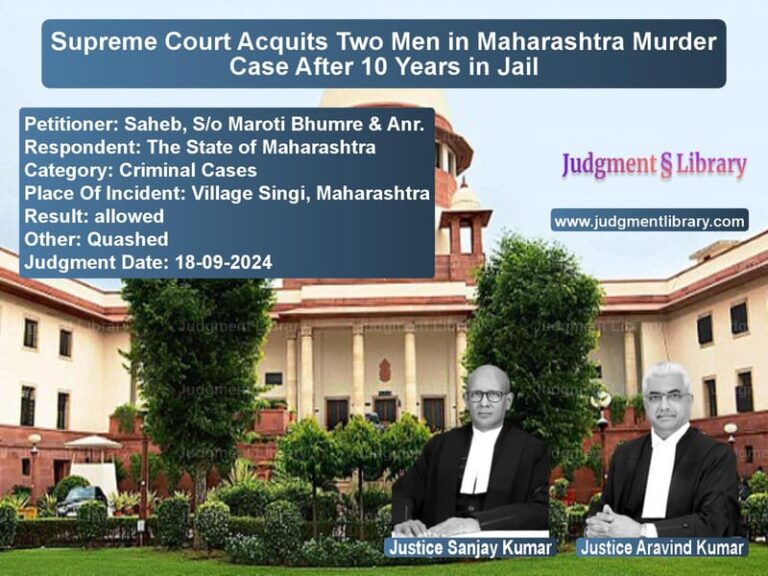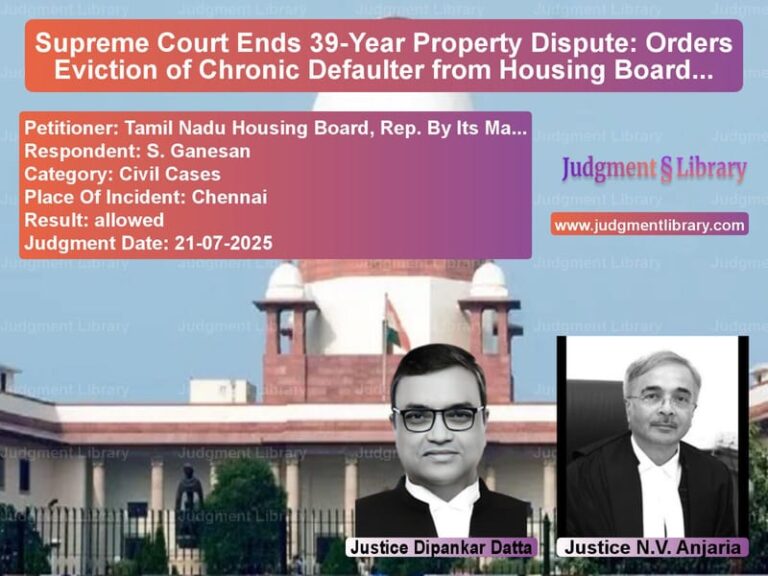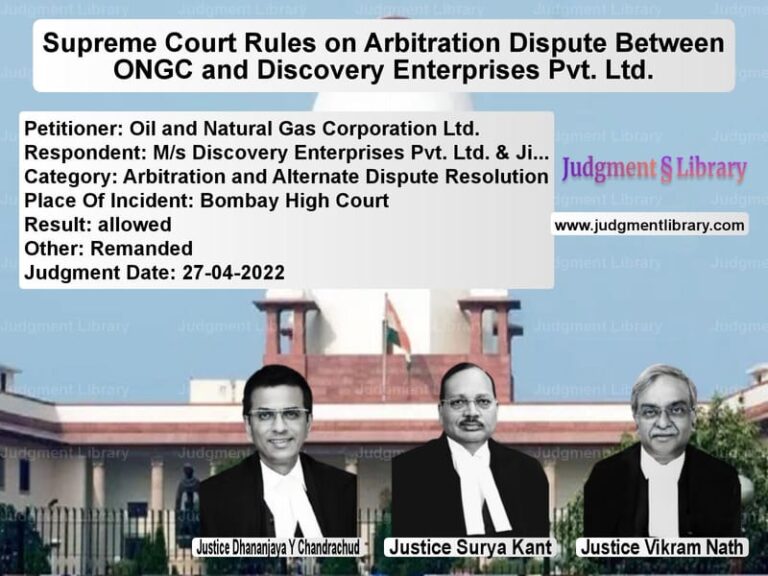State of Madhya Pradesh v. Marico Industries Ltd: Analysis of Entry Tax Dispute Over Mediker and Starch Products
This case involves a dispute between the State of Madhya Pradesh and Marico Industries Ltd. regarding the imposition of entry tax on two products—Mediker and Starch (Revive). The appellant, the State of Madhya Pradesh, challenges the High Court’s judgment that both products should not be subjected to entry tax. The issue arose from the classification of these products under the Madhya Pradesh Entry Tax Act, 1976 (E.T. Act), and whether they fall within the scope of taxable items under the Act.
Introduction:
The appellant, the State of Madhya Pradesh, imposed entry tax on Mediker (anti-lice treatment) and Starch (Revive), arguing that both products were taxable under the Madhya Pradesh Entry Tax Act, 1976. The products were initially classified as a shampoo and a chemical, respectively. However, the respondent, Marico Industries Ltd., contested the imposition, claiming that Mediker is a medicinal product and not a shampoo, and that Starch (Revive) is not a chemical. The High Court ruled in favor of the respondent, dismissing the tax claims. The appellant then appealed the decision to the Supreme Court.
Petitioner’s Arguments:
The appellant, represented by the State of Madhya Pradesh, argues that Mediker should be classified as a shampoo under Entry 32 of Schedule II of the E.T. Act, as it is commonly understood to be a shampoo product despite its medicinal properties. The appellant further contends that Starch (Revive) should be classified as a chemical under Entry 55 of Schedule II, as it is used in a chemical process, thereby subjecting it to entry tax. The appellant refers to the case of Deputy Commissioner v. G.S. Pai and contends that terms in tax legislation should be interpreted in their popular sense, not in a scientific or technical sense.
Respondent’s Arguments:
The respondent, Marico Industries Ltd., argues that Mediker is a medicinal product, not a shampoo, and therefore should not be subjected to entry tax. They point out that Mediker is classified as a drug under the Drugs and Cosmetics Act, 1940, and its primary purpose is to treat lice infestations, not to act as a general shampoo. The respondent asserts that Mediker satisfies the definition of a drug, and drugs are explicitly excluded from the E.T. Act. Regarding Starch (Revive), the respondent claims it is a starch product made from tapioca roots and should not be classified as a chemical, as it is used for laundry and not for chemical processes.
The Court’s Analysis:
The Supreme Court reviewed the definitions of ‘shampoo’ and ‘chemical’ under the E.T. Act and the relevant case law. The Court noted that the key issue was whether Mediker could be considered a shampoo, as defined in the Act, or whether it should be treated as a drug. The Court highlighted that Mediker contains D-Phenothrin, which is used to treat lice, and its primary function is medicinal. The Court agreed with the respondent’s argument that Mediker is a medicinal product and not a shampoo and therefore should not be subject to entry tax under Entry 32.
The Court also examined the classification of Starch (Revive) as a chemical. The Court noted that the product is made from tapioca roots and is used in washing clothes. It found no evidence to support the claim that Starch (Revive) is a chemical, and it could not be classified under Entry 55 of Schedule II of the E.T. Act. The Court emphasized that the common parlance test should be applied, and Starch (Revive) is not considered a chemical in everyday usage.
Conclusion:
The Supreme Court dismissed the appeal, agreeing with the High Court’s judgment that Mediker is a medicinal product and Starch (Revive) is not a chemical. The Court held that both products were not subject to entry tax under the Madhya Pradesh Entry Tax Act, 1976. The Court also noted that the burden of proof to classify the products as taxable goods lay with the appellant, and the evidence presented did not support the tax claims. As a result, the appeal was dismissed, with no order as to costs.
Don’t miss out on the full details! Download the complete judgment in PDF format below and gain valuable insights instantly!
Download Judgment: State of Madhya Prad vs Marico Industries Lt Supreme Court of India Judgment Dated 22-07-2016-1741873350989.pdf
Direct Downlaod Judgment: Direct downlaod this Judgment
See all petitions in Tax Evasion Cases
See all petitions in Banking Regulations
See all petitions in Customs and Excise
See all petitions in Judgment by Dipak Misra
See all petitions in Judgment by Prafulla C. Pant
See all petitions in dismissed
See all petitions in supreme court of India judgments July 2016
See all petitions in 2016 judgments
See all posts in Taxation and Financial Cases Category
See all allowed petitions in Taxation and Financial Cases Category
See all Dismissed petitions in Taxation and Financial Cases Category
See all partially allowed petitions in Taxation and Financial Cases Category







